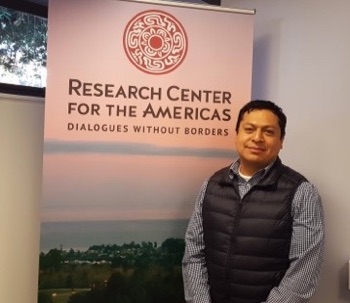Isaí Ambrosio is going back to school in January.
The program director of the Davenport Resource Service Center (DRSC) has been named the inaugural activist-in-residence of UCSC's Research Center for the Americas (RCA).
"For me, activism is about being proactive," said Ambrosio. "Here in Davenport, we have to be proactive. We have to go out and talk to people."
The residency is the brainchild of RCA Director Sylvanna Falcón, an associate professor of Latin American and Latino studies, who envisions it as a way to forge stronger ties between the university and the community.
"We were looking for people with demonstrated leadership in nonprofit and community-serving organizations, and Isaí really stood out to the selection committee," she said. "He has made a deep personal and professional commitment to social change and social justice in North County. He will be a great partner and looks forward to meeting with students, faculty, and staff."
As program director of the DRSC, Ambrosio oversees all services provided to hundreds of North Coast residents. The center runs a food program that distributes about 4,500 pounds of fresh donated food every month, as well as an afterschool homework club, a teen center, a walk-in food pantry, a summer recreation program, and senior programs.
It's a challenge to reach community members who are spread out from the county line all the way to the town of Davenport. Many of the center's clients are farmworkers who live on 11 ranches that dot the coastline from Western Drive to Swanton Road.
"We serve 600 to 800 people per year," said Ambrosio. "Every week, I go to every food distribution at the ranches. It's important for me to connect with them."
As part of the residency, Ambrosio will hold office hours on campus every Friday morning. He plans to visit classes, meet with faculty and students, and brainstorm ideas. He looks forward to helping students bridge the gap between the classroom and the "real world."
"The funny thing about school, is you can’t really see how the ideas and theories you're studying play out in the real world," said Ambrosio, who has a list of projects he hopes to develop during the residency, including a series of leadership workshops, and field trips for north coast mothers. "I want to hear fresh ideas that students and professors will share with me so that I can turn those ideas into real services."
About half the center's clients are Latino, including many recently arrived immigrants. "Most are low-income, a few are homeless," he said. "We serve everybody."
Now in its 41st year, the DRSC is one of six programs of the Community Action Board of Santa Cruz County. The center is housed in a modest building on a knoll behind Pacific Elementary School and adjacent to the landmark St. Vincent de Paul Catholic Church. Clients and visitors receive a warm welcome from bilingual staff members and volunteers, and Spanish-language materials are readily available.
Geographically separate from the bustling hub of Santa Cruz County, the North Coast is dominated by agricultural fields, open space, and windswept beaches. There are no grocery stores, medical offices, or dental clinics. For those without transportation, the area's remoteness is compounded by limited bus service. "I hear about people going to Watsonville to buy groceries at the Mexican stores," said Ambrosio. "On the ranches, people work, shower, eat, and go to bed. That's what I hear."
A former farmworker and a graduate of Cal State University Monterey Bay and Monterey College of Law, Ambrosio spent 10 years working with a faith-based community-service organization in Watsonville. He is particularly tuned in to the needs of mothers on the North Coast. "Latina mothers in the area have complex life stories," he said. "Many of them lack legal status, they don't speak English, they work a lot. They have a tough time communicating with their kids, and their kids' teachers."
Ambrosio hopes the residency will generate ideas about new ways to support mothers on the North Coast.
"Why is it so hard for them to learn English, when the men are able to? Why do they not gain legal status, when the men do?" he asks. "The moms are in a difficult position. What are the barriers they are facing? I want to develop programs or add to what we offer them."
For starters, he would like to organize field trips to UC Santa Cruz, the County Office of Education, the courthouse, and the police department to introduce them to local resources and familiarize them with the educational and legal systems.
The center supports all residents, including immigrants regardless of legal status. Ambrosio and his staff recognize that the climate for immigrants is far chillier under President Trump than it was during Barack Obama's presidency. Every door in the DRSC has a Spanish-language flyer posted on it, outlining the Constitutional rights of anyone in the building, in case of a raid by Immigration and Customs Enforcement (ICE).
"The environment is different, for sure," said Ambrosio. "You hear the teens joking about it. They're joking, but that shows that they are concerned. If their parents are undocumented, they are concerned."
Some clients are reluctant to provide personal information when they tap the center's services, and Ambrosio is careful to reassure them they he doesn't share personal information with funding agencies—only numbers. But the political climate has made it more challenging to reach all of those in need, especially those who don't visit the center in person. Hence Ambrosio's eagerness to collaborate with university partners on proactive strategies to expand the DRSC's reach.
"I'm excited and thankful for the opportunity," said Ambrosio. "I wasn't expecting it."



